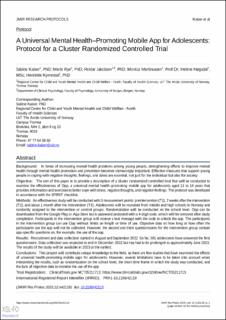A Universal Mental Health–Promoting Mobile App for Adolescents: Protocol for a Cluster Randomized Controlled Trial
Kaiser, Sabine; Rye, Marte; Jakobsen, Reidar; Martinussen, Monica; Høgsdal, Helene; Kyrrestad, Henriette
Journal article
Published version

Åpne
Permanent lenke
https://hdl.handle.net/11250/3046732Utgivelsesdato
2023Metadata
Vis full innførselSamlinger
Sammendrag
Background: In times of increasing mental health problems among young people, strengthening efforts to improve mental health through mental health promotion and prevention becomes increasingly important. Effective measures that support young people in coping with negative thoughts, feelings, and stress are essential, not just for the individual but also for society.
Objective: The aim of this paper is to provide a description of a cluster randomized controlled trial that will be conducted to examine the effectiveness of Opp, a universal mental health–promoting mobile app for adolescents aged 13 to 19 years that provides information and exercises to better cope with stress, negative thoughts, and negative feelings. The protocol was developed in accordance with the SPIRIT checklist.
Methods: An effectiveness study will be conducted with 3 measurement points: preintervention (T1), 2 weeks after the intervention (T2), and about 1 month after the intervention (T3). Adolescents will be recruited from middle and high schools in Norway and randomly assigned to the intervention or control groups. Randomization will be conducted on the school level. Opp can be downloaded from the Google Play or App Store but is password protected with a 4-digit code, which will be removed after study completion. Participants in the intervention group will receive a text message with the code to unlock the app. The participants in the intervention group can use Opp without limits on length or time of use. Objective data on how long or how often the participants use the app will not be collected. However, the second and third questionnaires for the intervention group contain app-specific questions on, for example, the use of the app.
Results: Recruitment and data collection started in August and September 2022. So far, 381 adolescents have answered the first questionnaire. Data collection was expected to end in December 2022 but has had to be prolonged to approximately June 2023. The results of the study will be available in 2023 at the earliest.
Conclusions:
This project will contribute unique knowledge to the field, as there are few studies that have examined the effects of universal health-promoting mobile apps for adolescents. However, several limitations have to be taken into account when interpreting the results, such as randomization on the school level, the short time frame in which the study was conducted, and the lack of objective data to monitor the use of the app.
